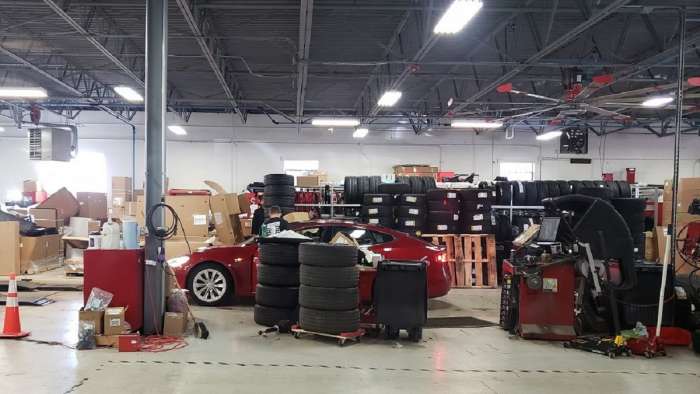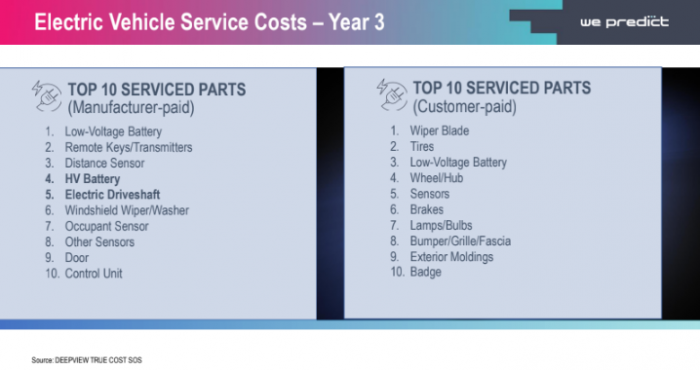A new study by We Predict finds that in the first three years of ownership, the actual cost to maintain and repair an electric vehicle is $235 less than traditional vehicles. This equates to a 30% difference in those costs vs conventional vehicles. Interestingly, it takes the full three years for the advantage to take effect.
The study found the following:
- At three months in service, EVs average service costs of $123; gas vehicles average $53. (EVs are 132% more)
- At 1 year in service, EVs average $306 in service costs per vehicle; gas vehicles $189. (EVs are 62% more)
- At 36 months on the road, EV service costs average $514; gasoline vehicles average $749. (EVs are 31% less)
These costs are not just consumer costs. Rather, the costs include what manufacturers and dealers pay as well. The EVs included the Ford Mustang Mach-E, which had the lowest actual cost over just three months (not years) at just $93. By contrast, the Jaguar I-PACE has a cost at that time period of $834, and the Porsche Taycan of $667.

What are these incurred costs? We Predict provided the following breakdown of where the costs in the first three years come from:

EVs have fewer mechanical parts than gasoline vehicles. One promise that EVs hold for buyers who have not yet made the switch away from liquid-fueled vehicles is that they have a significantly lower cost to maintain and repair. While nobody argues against the idea that EVs should be lower in cost to maintain and repair, are the savings meaningful? One interesting finding is that some gas-powered vehicles have a cost much lower than the average for EVs. For example, the three-year cost of maintenance and repair for the Mazda Miata is $275. About half the $514 an average EV costs.
Removing repairs and focusing only on the maintenance side, the incurred costs are hard to call significant. The study found that electric vehicles’ three-year average maintenance costs were $77/vehicle and that conventional vehicles had an average cost of $228/vehicle.
Related Story: 2021 Shoppers Take Note: These Vehicle Brands Offer Valuable Included Maintenance
Virtually every automobile sold in America is under its bumper-to-bumper warranty for the first three years of typical usage. That means that consumers rarely pay much for repairs during the first three years. In addition, many brands cover the cost of maintenance for some number of years after a new vehicle is purchased. For example, Jaguars come with five years of included maintenance, Hyundai vehicles for three, and Toyota for two. In each case, the costs are covered regardless of the type of powertrain. The truth is, the maintenance and repair costs of a new vehicle in the first three years are almost meaningless by comparison to depreciation, insurance, and energy costs. For many consumers, the cost is zero. To be clear, we are not including crash damage costs here. That is not what the industry term maintenance and repairs refers to.
Manufacturers and dealers do incur costs during this period. The dealer costs are then repaid by the manufacturers. We communicated with the producers of the study and asked them to clarify what the typical repairs include. Using EVs as the example, Renee Stephens, VP of Automotive at We Predict provided this breakdown of the data:
- Fifty-three percent of the $514 EV service cost comprised labor expense and forty-seven percent were part cost.
- Splitting the costs down, the majority was for repairs ($301), $136 was spent on campaigns, and $77 on maintenance.
Related Story: Toyota RAV4 Prime vs. Tesla Model Y Maintenance Cost Analysis - A Surprising Outcome
After the initial warranty and included maintenance period of three years, vehicle costs begin to shift directly to the vehicle owner. Consumer Reports did a full report on the longer-term cost differences for maintenance and repairs between vehicles with various types of powertrains. The surprise result was that plug-in hybrid-electric vehicles were virtually tied with EVs (actually ahead slightly) and that both had a meaningful long-term advantage over traditional designs.
Related Story: Tesla Model Y vs. Ford Mustang Mach-E - Which EV Requires More Maintenance?
You can view more about the study on the We Predict summary page. Does the study’s findings that EVs have a $235 advantage over conventional vehicles surprise you, or confirm your assumptions and experiences? Tell us in the comments below.
John Goreham is a long-time New England Motor Press Association member and recovering engineer. John's interest in EVs goes back to 1990 when he designed the thermal control system for an EV battery as part of an academic team. After earning his mechanical engineering degree, John completed a marketing program at Northeastern University and worked with automotive component manufacturers, in the semiconductor industry, and in biotech. In addition to Torque News, John's work has appeared in print in dozens of American news outlets and he provides reviews to many vehicle shopping sites. You can follow John on TikTok @ToknCars, on Twitter, and view his credentials at Linkedin
Re-Publication. If you wish to re-use this content, please contact Torque News for terms and conditions.
Set as google preferred source












Comments
The 3 year comparison shows
Permalink
The 3 year comparison shows up some savings, but I think that the 5 and 10 year comparison will be more dramatic, still favoring EVs. The first 3 years should be relatively repair free, and covered by warranty. But after 5 and especially 10+ years the simplicity of EVs should make an even bigger difference and ownership savings.
Spot on. Let's put the timing
Permalink
In reply to The 3 year comparison shows by DeanMcManis (not verified)
Spot on. Let's put the timing belt, spark plugs, starter motor, alternator, and oil filters in a museum. It's later in life when EVs hold their biggest possible gains. Let's hope Mfgs will not equip every one with a tire that costs $250 each.
The truth is out there...
Permalink
The truth is out there...
just not here!
Except when the battery pack
Permalink
Except when the battery pack needs replacing, at which point all prior savings evaporate. And there is one factor that nobody seems to talk about: todays repair technicians, at dealer or independent shop, have no idea how to fix these cars when something goes wrong. They'll just keep guessing and throwing parts at your car until you run out of money, or out of patience, or both.
And, if EVs turn out not to need any repairs, then government will mandate some unnecessary "maintenance" or "certification" services to prop up the auto repair industry. Remember vehicle emissions testing? People started hanging on to their older cars that were simpler and easier to fix. So government stepped in to stimulate newer vehicle sales by making your old car illegal to operate or too expensive to repair. Remember digital tv, that was introduced when digital tv sales were slower than desired? Just wait and see.
While I'll admit that battery
Permalink
In reply to Except when the battery pack by Dashel Roberts (not verified)
While I'll admit that battery replacement cost a common fear, the reality for less expensive EVs is not so dramatic. It is not as if ICE/gas vehicles have not maintenance costs, and often expensive repair costs after 10-15 years or so. Depending on the vehicle, and it's condition. All modern cars are complex and expensive to repair. Plus as battery prices fall, replacement pack prices will fall as well. And you are getting MANY years of use out of these EVs before there are any repair costs whatsoever. There is a reason why car dealerships are (quietly) fighting so hard to not sell EVs. They get most of their revenues from ICE vehicle maintenance and repairs.
Well said, Dean. And may I
Permalink
In reply to While I'll admit that battery by DeanMcManis (not verified)
Well said, Dean. And may I add that most EVs come with battery warranties that cover 80% or more of the expected lifespan of the vehicle. Typically 150,000 miles. An affordable EV with a dead battery at 150,000 miles is not a catastrophe financially. Had every Bolt battery not required replacement this argument would be moot, but now it is resurfacing, unfortunately.
"The study found that
Permalink
"The study found that electric vehicles’ three-year average maintenance costs were $77/vehicle and that conventional vehicles had an average cost of $228/vehicle."
I would have to presume the study is not including the recommended annual brake caliper servicing in salted-road climates or most EV owners are not having it performed.